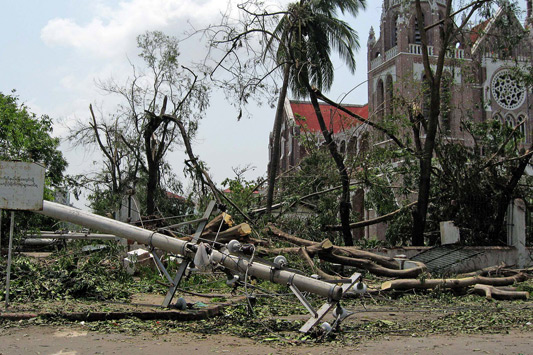Myanmar toll ‘at least 15,000’
Cyclone leaves hundreds of thousands homeless and warnings death toll could rise.

 |
| Nargis knocked out power and caused widespread flooding and damage [AFP] |
Nyan Win, the foreign minister, said on state television that 10,000 people had died in just one town, Bogalay, as he gave the first detailed account of what is emerging as the worst cyclone to hit Asia since 1991, when 143,000 people were killed in Bangladesh.
| In depth: Myanmar cyclone | |||
|
|
“In Irrawaddy Division the death toll amounts to more than 10,000,” he said in a state television broadcast.
“The missing is about 3,000. In Bogalay, the death toll is about 10,000.
The minister also said the military government welcomed outside assistance, an unprecedented green light to governments and aid agencies who want to help with the recovery.
Nargis swept through Myanmar on Saturday, knocking out power and causing widespread flooding and damage.
“When we added up the numbers that comes to somewhere in the region of two million people.”
 |
| Groups are concerned the government will not be able to cope with the disaster [EPA] |
Thousands of people, especially those in the shanty towns, have no shelter, power or water.
‘Dire situation’
Al Jazeera’s correspondent, who cannot be named for security reasons, said although the clean up operation in the costal city of Yangon – the former capital and biggest city – appeared to be going quite well, the situation was dire in other areas.
Electricity and water lines were down, but the military and police were on the ground clearing trees off the road and getting water supplies to people in Yangon, she said.
 |
| Locals and the military have begun the clean-up in Yangon [AFP] |
But in the Irrawaddy Delta, a huge area just a few hours from Yangon, the situation was dire and appeared to be getting worse by the hour.
Chris Kaye, the UN’s acting humanitarian co-ordinator in Yangon, confirmed that “the Irrawaddy delta was hit extremely hard not only because of the wind and rain but because of the storm surge”.
“The villages there have reportedly been completely flattened.”
It is unknown to what extent the destruction caused by the cyclone will affect the holding of a referendum on May 10, on a new charter backed by the ruling generals.
But the government indicated that it would proceed as planned.
“It’s only a few days left before the coming referendum and people are eager to cast their vote,” the state-owned newspaper Myanma Ahlin said on Monday.
The military says the vote is the first stage in a seven-step “road map to democracy”, intended to culminate in multi-party elections in 2010.
The process has been criticised by opposition groups which say the process is intended only to tighten the military’s grip on power.
